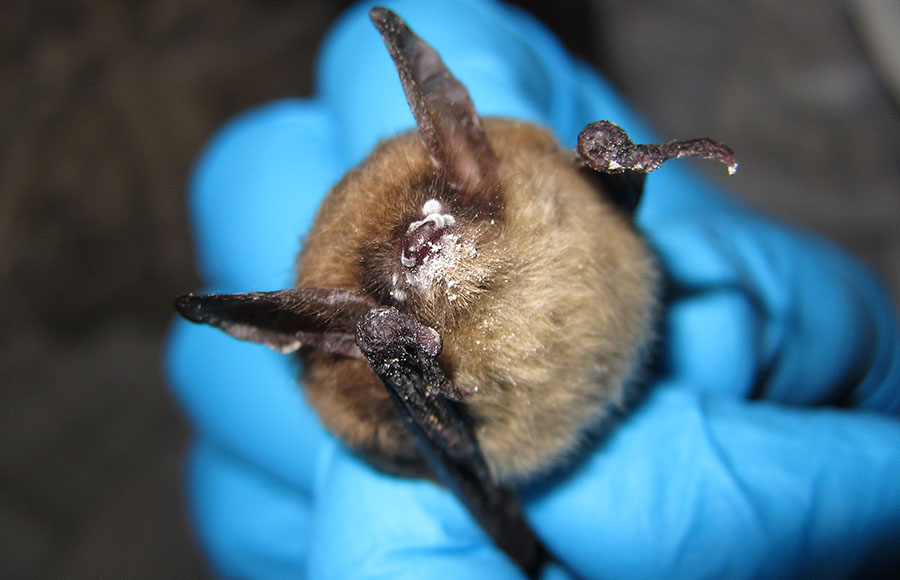BOONE, N.C. — Lurking among the many bat species that make the Blue Ridge Parkway area their home — the eastern red bat, the big brown bat and the silver-haired bat, to name a few — is a silent killer known as white-nose syndrome (WNS).
Dr. Mark Spond, Appalachian State University’s liaison to the National Park Service (NPS), was awarded $8,098 in NPS funding to conduct a noncontact survey — specifically, an acoustic survey — of bats in the Blue Ridge Parkway area in fall 2018. An acoustic survey involves monitoring bat activity by listening to and/or recording the ultrasound — sound with a wave frequency higher than the human ear can detect — the bats produce.
The survey data, which is under evaluation by the NPS, contributes to the knowledge base for the distribution and extent of WNS in the southern Appalachian Mountains.
“In addition, the study assists Blue Ridge Parkway staff in identifying any rare bat species that may inhabit the parkway corridor,” Spond said.
According to NPS, WNS is a fungal disease killing hibernating bats in North America, and the particular fungus that causes the disease, Pseudogymnoascus destructans, is likely exotic, having been introduced to North America from Europe.
“Researchers call the disease ‘white-nose syndrome’ (WNS) because of the visible white fungal growth on infected bats’ muzzles and wings. This cold-loving fungus infects bats during hibernation, when the bats reduce their metabolic rate and lower their body temperature to save energy over winter,” the NPS website states.
“What started in New York in 2006 has spread to more than half of the United States and five Canadian provinces by August 2016, leaving millions of dead bats in its path. WNS causes high death rates and fast population declines in the species affected by it, and scientists predict some regional extinction of bat species.”
Spond said, “Enhanced knowledge of resident bat species, and potential threats to their survival, is critical for the development of management strategies designed to promote species richness and persistence on the (Blue Ridge) parkway.”
For the project, Spond collaborated with Mackenzie Clark ’18, an Appalachian alumna who holds a B.S. in biology. Clark was a research technician in the university’s College of Arts and Sciences last fall.
What do you think?
Share your feedback on this story.
About the Appalachian State University Liaison to the National Park Service
The Appalachian State University Liaison to the National Park Service (NPS) is the central contact for initiatives that partner Appalachian with NPS units across the United States. The liaison promotes opportunities, such as service projects and task agreements, that mutually benefit NPS units and university students, faulty, staff and alumni. Past projects have partnered members of the Appalachian Community with NPS natural/cultural resource personnel, interpreters and educational initiatives. Learn more at https://npsliaison.appstate.edu.
About the College of Arts and Sciences
The College of Arts and Sciences (CAS) at Appalachian State University is home to 17 academic departments, two centers and one residential college. These units span the humanities and the social, mathematical and natural sciences. CAS aims to develop a distinctive identity built upon our university's strengths, traditions and locations. The college’s values lie not only in service to the university and local community, but through inspiring, training, educating and sustaining the development of its students as global citizens. More than 6,800 student majors are enrolled in the college. As the college is also largely responsible for implementing App State’s general education curriculum, it is heavily involved in the education of all students at the university, including those pursuing majors in other colleges. Learn more at https://cas.appstate.edu.
About Appalachian State University
As a premier public institution, Appalachian State University prepares students to lead purposeful lives. App State is one of 17 campuses in the University of North Carolina System, with a national reputation for innovative teaching and opening access to a high-quality, cost-effective education. The university enrolls more than 21,000 students, has a low student-to-faculty ratio and offers more than 150 undergraduate and 80 graduate majors at its Boone and Hickory campuses and through App State Online. Learn more at https://www.appstate.edu.





![How NCInnovation Is Rethinking Economic Development in North Carolina [faculty featured]](/_images/_posts/2026/02/rethinking-economic-development-600x400.jpg)






